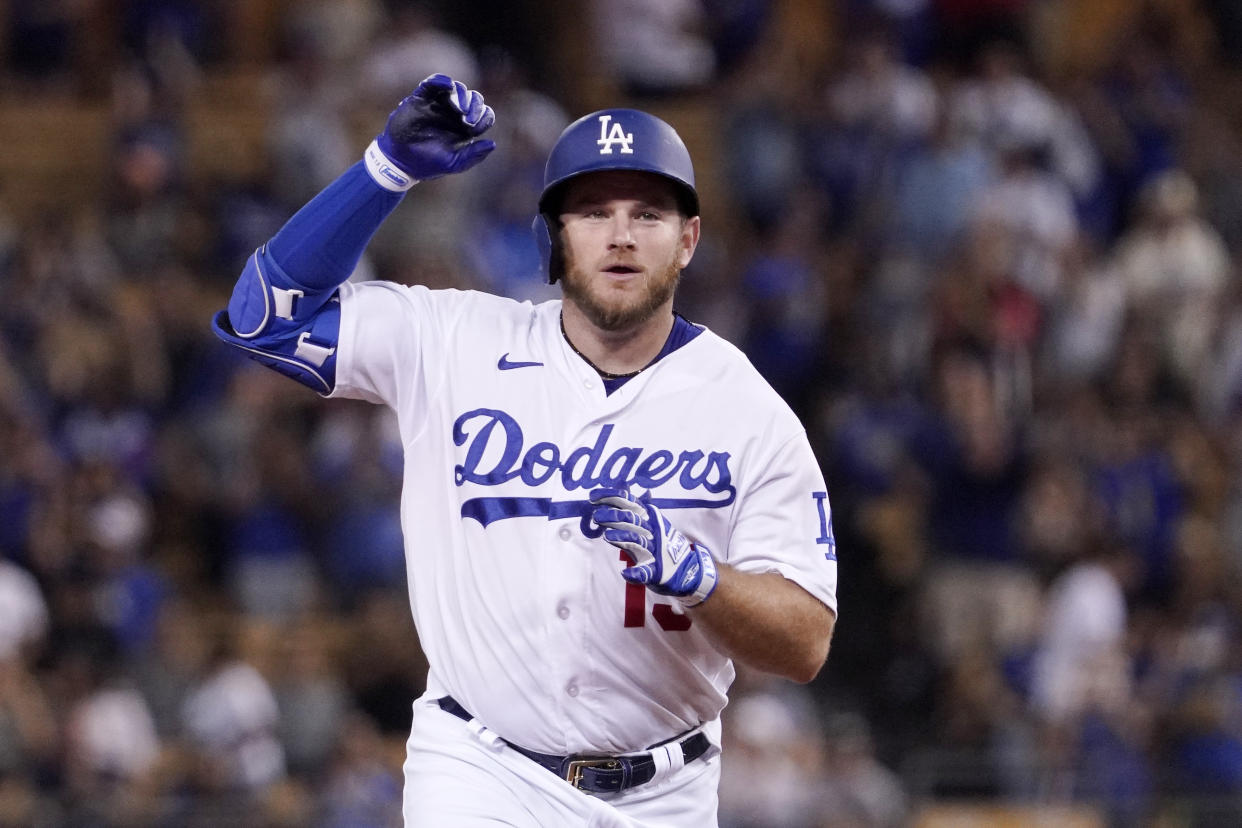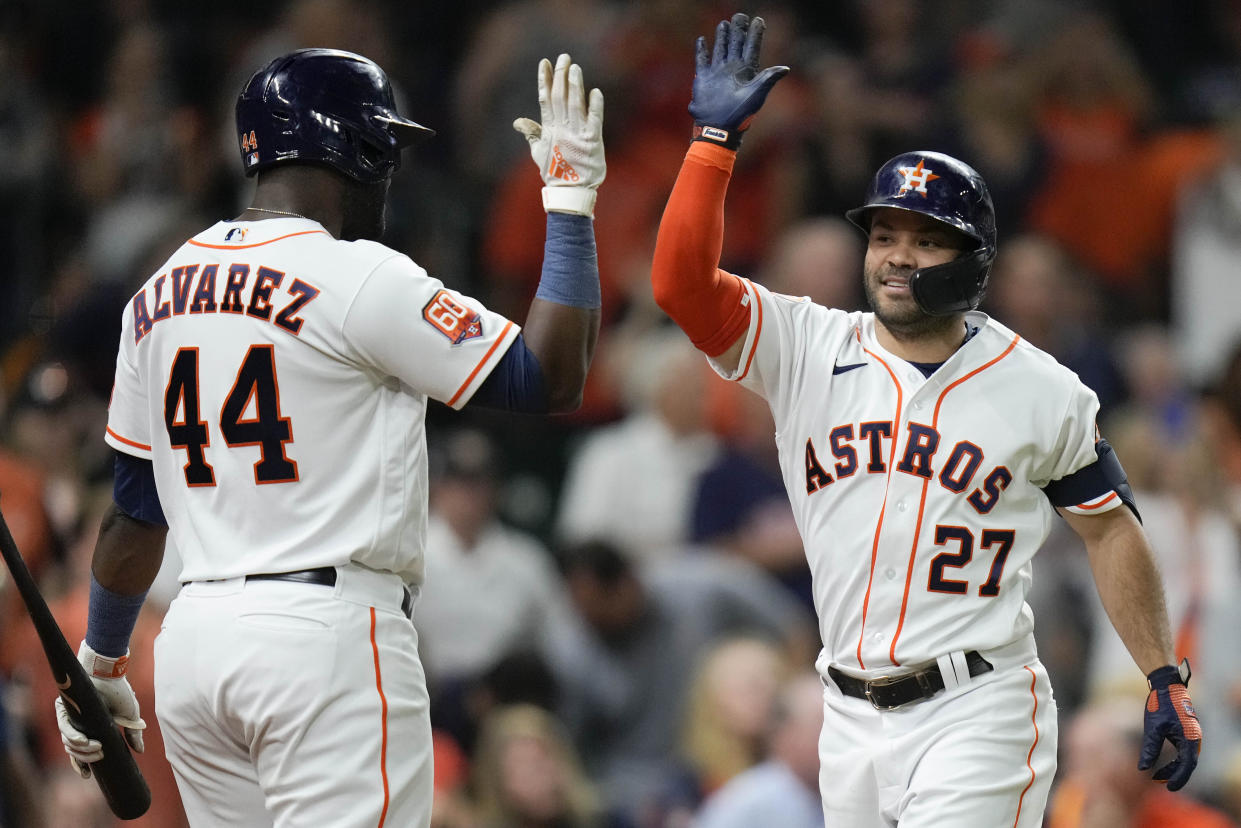Making sense of the Dodgers' and Astros' sustained success is rather simple
Last week, the Los Angeles Dodgers went to New York for a midweek series that was imbued with extra-special stakes for its potential as a postseason preview: a chance to find out how the top two winningest teams in the National League would fare against each other. The Mets took two of three to walk away feeling more triumphant than Timmy Trumpet pantomime riding his namesake instrument.
The games were great, hard fought and close, and the results speak to the possibility that the Mets will make a deep postseason run come October. But they do not upend the existing hierarchy or dislodge from the top spot the Dodgers, who can add their one win in Flushing to 92 others, plus a whole backlog from recent seasons.
The top of their lineup boasts rings from three other clubs: Mookie Betts, who won in 2018 with the Boston Red Sox; Trea Turner, who won in 2019 with the Washington Nationals; and Freddie Freeman, who won last season with the Atlanta Braves.
They know how it feels to play on a championship-caliber team, so what makes the Dodgers different?
“I think that was a little bit more of a cultural thing,” Turner said about the Nationals team that went from 19-31 to wild card to World Series winners.
“We all liked each other and hung out with each other and we were really close. So I think talent, plus how much we enjoy one another was the success there. Here, we definitely enjoy each other — and I think we've come together a lot in the last few months, which is really important and cool — but I just think we would have won regardless, whether we liked each other or not. Just ‘cause of the talent and everything.”

Insofar as the Dodgers have a secret sauce, this explanation does little to illuminate it. Which makes sense. Their secret part is how they’re able to turn 31-year-old below-average pitcher Andrew Heaney into a sub-3.00 middle-of-the-rotation regular on a staff with the best ERA in baseball. Acquiring guys like Turner — practically an afterthought of the Max Scherzer deal that brought him to L.A. last summer — that’s the fun part of being a behemoth.
The answer has stuck with me ever since anyway. Not because it says anything especially revelatory about the inner workings of a specific organization, but because it reflects a funny sort of paradigm in the sport. To win a World Series you need a mercurial magic that’s hard to define and impossible to predict. Sustained excellence is something much simpler. Not easier, just simpler.
MLB’s postseason is one month away. Down the stretch, teams will jockey for a berth that erases the previous six months. In October anything can happen. And in the end we’ll crown a deserving champion — that every baseball season requires the last team standing to both run a marathon and then survive a sprint is a feature, not a bug. But since we’re to the part of the year where the superlatives start to really mean something, it just feels worth mentioning that we already know the best team in each league. It’s been the same two for the past five years.
The Dodgers got a head start. Including 2022 (and I feel pretty good about doing so), they’ll have finished first in the NL West nine out of 10 seasons. The one year they didn’t, they matched a franchise-high with 106 wins and came up just short in a division race that deserves to have a book or maybe an epic poem written about it. So just keep that in mind for your own sense of awe — the Dodgers have been doing this for nearly twice as long — as we tighten the time frame to include the AL’s best: the Houston Astros.
Since the start of 2017, the Dodgers have won 544 games, the most in MLB. The Astros are second with 522. Only one other team clears 500, the Yankees with exactly that many.
(Their continued success in the years since does not excuse the Astros’ sign-stealing, but it provides a compelling, if complicated, case that they would have been good without it. Three years after the sanctions, they’re on pace for 104 wins. You’d have to think they stole 22 wins to undermine this argument.)
This is no fluke: Houston has scored the most runs in that span; L.A. is second. L.A. has given up the fewest runs in that span; Houston is second. They have the highest two team wRC+ in that time and the lowest two ERAs. Defense is harder to distill into a universally accepted metric, but they also have the lowest two opposing BABIP in that time, a testament to the ineffectiveness of putting the ball in play against them.
Both their championships come with caveats, shall we say, and each would likely need another to entertain dynastic consideration. But even the rings they have are notable: The other three winningest teams in that five-year span — Yankees, Tampa Bay Rays and Cleveland Guardians — have all failed to win a World Series. Consistently dominating the regular season and peaking in the postseason is a tier of two.
“Well, we weren’t good for a lot of years, obviously,” Lance McCullers Jr. said recently of the Astros’ run of success. And that’s certainly part of it. They did this on purpose, and being bad was part of that plan. But the cyclical sacrifice required to tank is precisely why sustainability is considered the ultimate achievement. And including 2017, neither the Dodgers nor Astros have selected higher than 15th in the draft since.

McCullers drew the connection between the Astros’ front office and disgraced former general manager Jeff Luhnow’s career start with the St. Louis Cardinals, a club that has managed to stay similarly relevant — if not quite as fruitful — with a smaller payroll and for far longer. St. Louis has had only one losing season this millennium, reliably turning middle-of-the-pack draft slots into homegrown talent that learns to win together in the lower levels, expertly complemented by a select few high-profile acquisitions.
And to that blueprint, the Astros added early adoption of advanced analytics.
“It's not only ‘here's the information,’ it's ‘here's the information and here's how you should try and apply it,’” Astros third baseman Alex Bregman said recently.
McCullers said the Astros have always used data to simplify players’ processes, rather than complicate them. Bench coach Joe Espada, who coached for the Miami Marlins and Yankees, added: “It’s just part of our DNA, it’s who we are and it's part of our process. It's actually the best I've seen on the teams that I've been with.”
Of course all good teams rely on data. Beyond that, Turner distills the Dodgers’ particular strengths down to “depth and matchups.”
Well, that and relatively unmatched financial might.
“They do a really good job putting people in a position to have success here,” he said. “So not only do they have the depth from development, spending the money and all that, but then also I feel like the matchups and the way they use people is really efficient.”
This is all a pretty long-winded way of saying look at the cumulative standings. And a pretty cursory look at the machinations behind the scene that make them possible. But since the whole point is to determine the top teams, it’s worth considering that at a certain scale, the answer and the evidence is incontrovertible. There will be plenty of good stories in October this year, mostly premised on long droughts and skin-of-their-teeth finishes. Plus two teams with the best cases to be there — and that can be fun, too.
Just ask Trey Mancini, whose career with the Baltimore Orioles involved a lot of losing in service of what is hopefully an Astros-esque future before getting traded to Houston at the deadline. Recently, he provided a compelling assessment of the vibes inside a clubhouse that’s used to winning.
“It's great,” he said. "I mean, it's awesome.”
